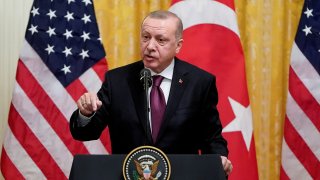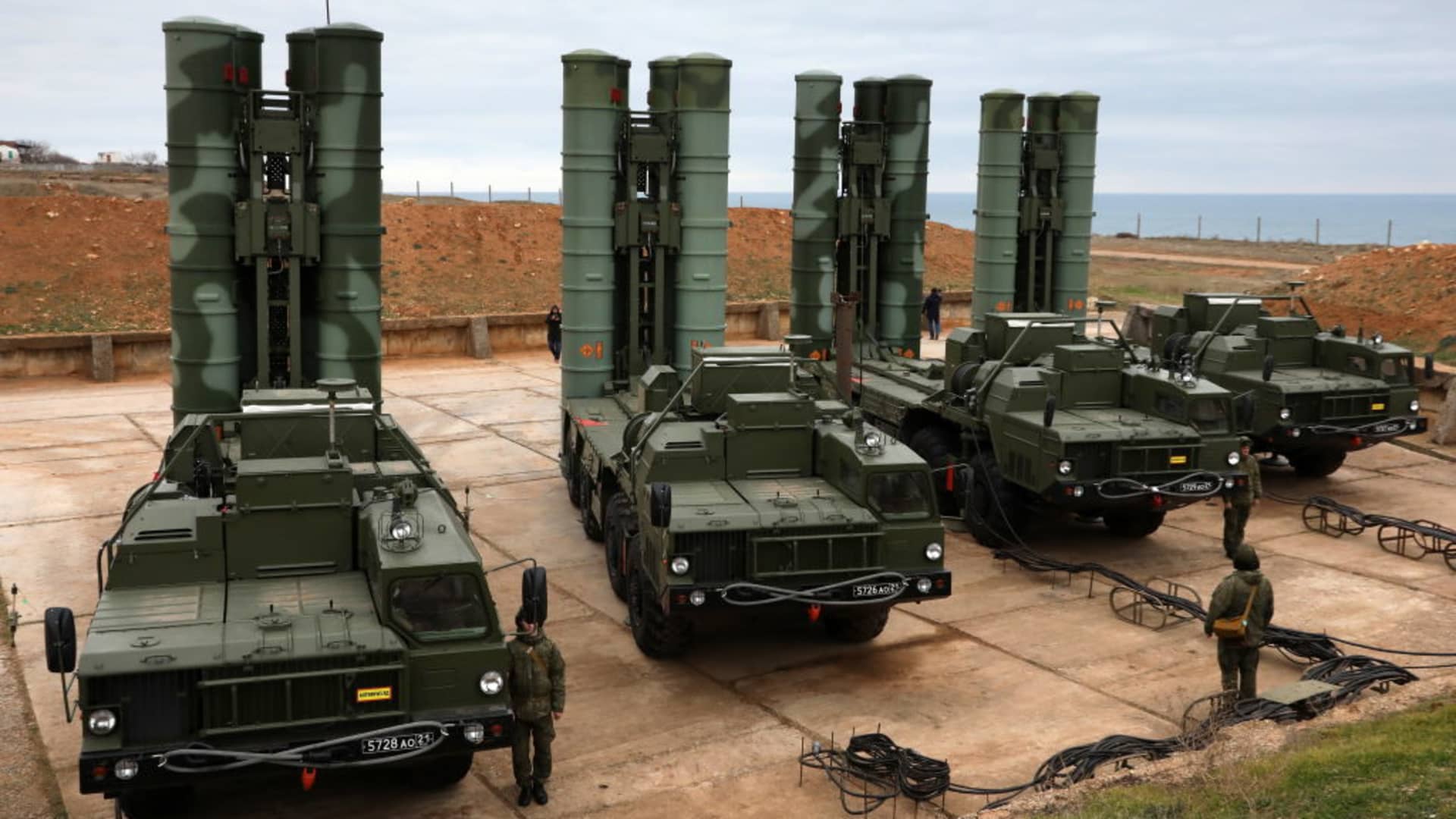
- The Turkish lira, on a steady downward slide for the majority of this year, held roughly flat throughout the trading day on Tuesday.
- President Donald Trump had previously held back on the sanctions, despite numerous warnings from his administration and Congress ever since Turkish President Recep Erdogan purchased Russia's S-400 missile defense system.
- U.S. sanctions could have been a massive blow for the country of 82 million, but according to analysts and the response of Turkish markets, these won't be.
DUBAI, United Arab Emirates — Turkish markets were largely unmoved on Tuesday following the news of U.S. sanctions on Turkey for its purchase of a Russian missile system against NATO opposition.
The Turkish lira, on a steady downward slide for the majority of this year, held roughly flat at around 7.84 to the dollar throughout the trading day on Tuesday.
President Donald Trump had previously held back on the sanctions, designed under the Countering America's Adversaries Through Sanctions Act (CAATSA), despite numerous warnings from his administration and Congress ever since Turkish President Recep Erdogan brokered a deal in 2017 with Russian President Vladimir Putin for its S-400 missile system, reportedly worth $2.5 billion. Turkey began receiving the missile parts in 2019 — resulting in its exclusion from America's F-35 program with NATO allies — and reportedly tested the system last October.

"Markets probably understand the sanctions for what they are: symbolic with minor if any impact on financial or real sectors," Erik Meyersson, senior economist at Handelsbanken Macro Research, told CNBC. That's because out of all the penalties available under CAATSA, the ones applied on Monday were particularly light.
The sanctions ban all U.S. export licenses and authorizations to Turkey's Presidency of Defense Industries and impose asset freezes and visa restrictions on the organization's president and other senior officers.
Money Report
'It's about time'
"It's obviously a nuisance for the institution and individuals targeted. But in broader terms, I see rather limited negative spillovers onto the financial and real sectors," Meyersson said.
Still, Turkish government officials roundly condemned the move. "No country's sanctions will sway Turkey's determined stance. We condemn this decision and call on the US to step back from this mistake as soon as possible," Vice President Fuat Oktay said via Twitter.
The announcement received bipartisan praise among U.S. lawmakers, with Sen. Chris Van Hollen (D-Md.) saying: "It's about time. I'm glad to see Congress do what the Administration would not – and show President Erdogan that we will not back down when it comes to protecting our security and that of our faithful NATO allies."
The statement alluded to Trump's seeming unwillingness to sanction Turkey in the past, owing, many believe, to a warm relationship between the two leaders. For the administration's part, Secretary of State Mike Pompeo wrote in a statement Monday: "Turkey is a valued ally and an important regional security partner for the United States, and we seek to continue our decades-long history of productive defense-sector cooperation by removing the obstacle of Turkey's S-400 possession as soon as possible."
Designed to spare Turkish markets?
Turkey's economy is deep in recession after several years of a falling currency, double-digit inflation, and rising employment even before the pandemic hit. The U.S. sanctions could have been a massive blow for the country of 82 million, but according to analysts and the response of Turkish markets, they won't be.
"Compared to the sanctions options which could have been chosen — say Iran sanctions are a 10, and Russia 3 out of 10, these were something less than 0.5," Tim Ash, senior emerging markets strategist at Bluebay Asset Management, wrote in an email note.
"Message seems to be that these were specifically designed by the Trump administration to limit the hit to the Turkish economy and markets."
Handelsbanken's Meyersson agreed. "The sanctions happened now because Congress basically forced Trump's hands," he said.
The timing is important: just weeks ahead of President-elect Joe Biden's inauguration as president. Biden has called Erdogan an "autocrat" and suggested a harder line on the country for its controversial foreign policy moves. But the softness of these sanctions could set the stage for reconciliation as well, Ash said.
"The good news for the market is that they are out of the way, and it clears some of the page for Biden to re-write the script of U.S.-Turkey relations when he takes office," he wrote.
As a NATO ally with the second-largest military in the transatlantic alliance and highly strategic air bases that host thousands of U.S. troops and weapons, Turkey is a very important partner — and could be a very difficult adversary. It should be a priority, Ash said, for the U.S. to pull Erdogan back into the Western fold and away from Russian and Chinese orbits. How easy that will be given Erdogan's growing closeness with U.S. adversaries and increasingly aggressive foreign policy, however, in addition to Biden's own agenda, is yet to be seen.
—CNBC's Amanda Macias contributed to this report.






